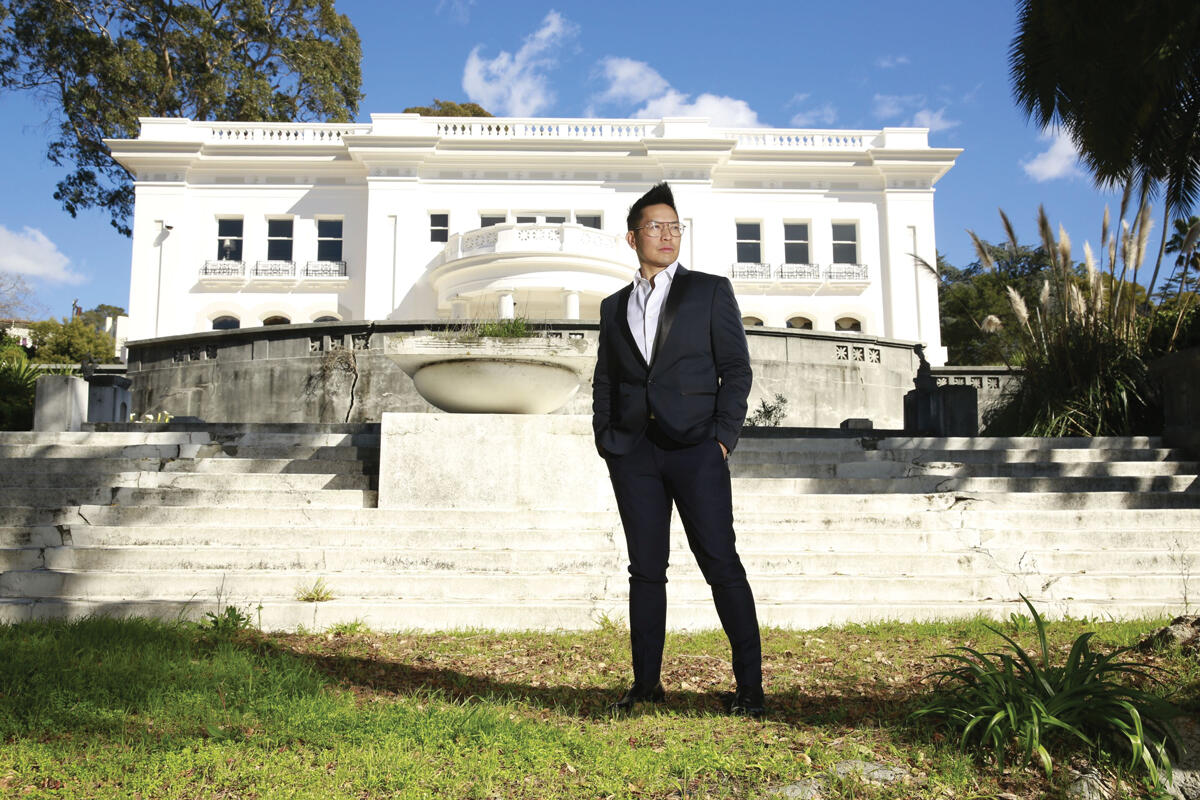With over 20 years as a Bay Area real estate agent, Herman Chan has had his share of cookie-cutter, quick-sale properties. But it’s the oddballs that really get his heart racing.
“I am getting a weird reputation for listing outlier properties,” he said. “Mind you, these take 10 times more work, the inventory of buyers is smaller and I know there are agents banging out listings like they’re on a conveyor belt. But that would be very boring for me. I guess I court the quirkiness.”
Chan’s approach is high-touch and labor-intensive, involving detailed historical research along with elaborate video productions and media strategies. And it’s helped him build a lucrative career, taking his enthusiasm for outlier properties all the way to the bank. He’s one of “America’s Best” individual agents, according to Real Trends. But his dedication to old-school, hands-on methods goes against the broader trends of reducing the art of home sales to a volume game or an algorithmically driven science powered by an app.
Chan’s flair for performance is inseparable from his personality. He recalled asking his high school English teacher if he could do a live poetry reading in full costume instead of writing a book report.
“I actually dressed up as Anne Sexton,” he said. “I could have done something just like everybody else, but, no, I just had to do something special.”
That same dramatic sensibility can be seen in his promotional videos, like the almost-17-minute-long mini-TV episode he produced and starred in for an East Bay property that is equal parts history and whimsy.
Disneyland meets Hearst Castle
Longtime owners Mitra Ara and Iraj Zandi had gone through four or five agents before turning to Chan to find a buyer for their unusual Pleasanton property — complete with bejeweled ceilings, an in-wall foyer fish tank, a sprawling garden filled with antiques from the 1915 World’s Fair and even its own redwood grove.
“We were concerned that our historical villa would be tough to sell unless we found an agent who was not ‘all show and no go,’ who was capable of recognizing the strength and worth of the property and was equipped with the necessary skills to communicate with the interested buyers,” Ara said.
Chan took a deep dive into the property’s history as the estate of Phoebe Hearst — the mother of William Randolph — and later part of a “dude ranch’’ for a bon vivant developer who was friends with luminaries like Frida Kahlo and Clark Gable. And he held the longtime owners’ hands through the “traumatic” experience of selling their home of 34 years, which was made even harder by Chan’s compelling marketing campaign, Ara said. His presentation of the home nearly gave the owners sellers’ remorse.
But sell they did, for $3.45 million, as Chan’s “Disneyland Meets Hearst Castle” video brought in multiple offers.
Chan recalled that, for all his emphasis on the property’s provenance, the winning buyer turned out to be most interested in the large, flat-view lot the home sat on. He immediately saw that all his historical research was irrelevant to this buyer, and he pivoted.

“I could have talked to him about Clark Gable partying there, but he didn’t care about that,” Chan said. “That whole angle was a great marketing tool, but even though you want to cast a wide net, once you actually catch the fish, you have to see what that fish wants.”
Chan has been catching a lot of fish. In 2020, the Golden Gate Sotheby’s agent brokered over $66 million in sales, according to company figures. By mid-September of this year, Chan had already surpassed last year’s tally; he estimates he’ll break $80 million this year. He has been included as a top-100 broker in San Francisco magazine, and Real Trends’ “America’s Best” for 2021 lists Chan in the state’s top 200 individual brokers.
It’s not the $100 million-plus that some higher on the list have closed, though Chan pointed out that some of those “individual” agents actually have a whole team working behind the scenes, while he has just one executive assistant. But it puts Chan in the upper echelon of Bay Area brokers, a position that was hardly certain when he was starting out.
Seeing the light
Early in his career, Chan found that being a gay man, even in the Bay Area, sometimes cost him clients. So did his youthful appearance.
“If the client was gay or maybe a divorcee, we were like BFFs,” he said. “But if the man was more conservative, I would never get the deal because they just wouldn’t resonate with me.”
Others ruled him out because they thought him too young. Even a decade into his career, many assumed he was the assistant when he arrived to take a meeting.
“I’m asking someone to give me a listing worth a million dollars and I look like their grandkids,” Chan recalled. “So I would just try 10 times harder and try to be perfect in every way, which is terrible for my mental health. But now I try to let that go. You cannot be all things to everybody.”
That life lesson was hard-won for Chan. In 2000, the recent UC Berkeley graduate hated the grind of his marketing job at Gap headquarters in San Francisco. He didn’t like the workplace politics or feeling as though his employers “owned” his time. He quit within three months.
“I realized, wow, these are my people, allegedly — it’s fashion, it’s in the Bay Area and it’s a really forward-thinking company — and if I cannot survive and be happy in this environment, there is nowhere else in corporate America that I will survive.”
As the son of Chinese immigrants who went to a “crazy tiger mom” high school in Fremont, Chan said dropping out of corporate life was certainly not the game plan. If he wasn’t in business, he recalled, doctor or lawyer were the only other acceptable career options as far as his family was concerned.
But he also had an uncle who was a successful real estate agent. Both his parents had their licenses as well, though they primarily used them to buy and sell their own properties. So when Chan’s mother suggested he sell real estate to make a living while he studied for his MCATs or LSATs, he decided to give it a try.
Instead of the work being a stopgap measure, he appreciated moving from listing to listing and learning about new properties and clients. He also saw that real estate could be financially rewarding, and he was loath to pile up hundreds of thousands of dollars of student loan debt for possible careers he no longer wanted.
The study guides sat on the shelf for over a year before he finally came clean to his parents — he was never going to be a doctor or a lawyer. He was meant to be in real estate.
“When I saw the light, how could I ever go back?” he said.

70 Castlewood Drive, Pleasanton
Chan never got to use his marketing degree in the business world, but it comes into play everytime he creates a custom listing video, where he typically acts as both the producer and the star.
Chan’s comfort in front of the camera led him to be cast on an episode of HGTV’s “My House Is Worth What?” which was followed by several appearances on “House Hunters.” He also shot a pilot for a Logo show and made it through several rounds of interviews for the San Francisco edition of Bravo’s megahit franchise “Million Dollar Listing.”
Now, though, the TV era is “over,” he said. Today “it’s about creating your own presence on your platforms.” For a recent $10 million listing in Alamo, for example, Chan invited L.A. YouTube influencer Enes Yilmazer to tour the house. The video Yilmazer posted — “INSIDE a $10,000,000 California Mega Mansion with Garage Full of Supercars!” — got 1.6 million views.
Who needs work-life balance?
For someone who was so concerned about being “owned” by his job, Chan can see the irony in choosing a career path that requires not just 9-to-5 hours, but very often weekends and evenings, too.
“For me, when you find out what you like to do, it’s not work,’’ he said. “To be away from it is almost a punishment.”
Even so, the pandemic has put some things in perspective. He realized that as his clients were taking stock of what was most important to them, he still couldn’t narrow in on what really mattered to him outside of real estate. Even his philanthropic work, like serving as the national luxury chair for the Asian Real Estate Association of America, is work-related, Chan admitted.
But even within the work sphere, Chan found he does enjoy mentoring the next generation of real estate agents. He is particularly proud of his executive assistant, Sahil Mehta, who he saw as a kindred spirit from their very first meeting, where he assessed not just Mehta’s strong work ethic but how well he treated the staff at the restaurant where they met.
It was a memorable meeting for Mehta as well. He was still a student at UC Berkeley, albeit one who already had his real estate license and had closed his own deal before he took the fateful meeting with Chan. It could have been stressful, but Mehta said he instantly felt at ease with his new mentor.
“Herman always knows how to make people, including me, feel good in the toughest situations,” he said. “That is Herman’s secret sauce.”
Five years later, at age 25, Mehta still works for Chan and has become a mini-mogul who owns several East Bay properties and makes over $500,000 a year from commissions and rental income, according to a CNBC profile.
Even though Mehta is doing well enough on his own to leave his executive assistant role behind, he finds himself staying on.
“This may sound cheesy, but what has kept me motivated to work for Herman is the genuine joyful environment, which sounds crazy because looking from the outside in, it may seem like a tornado of stress and chaos,” he said. “But the support structure Herman brings, he never makes it feel that way.”
Mehta is part of a new generation of real estate agents who Chan, 43, has seen entering the business in bigger and bigger numbers in recent years. The amount of money to be made in real estate, as well as the increased funding for new technology in the industry, is part of a sea change in how young people perceive the business, he said. What was considered a lesser-than job performed by “your 60-year-old aunt” when Chan was just starting out is now an enviable career for many members of Generation Z.
But Chan believes those sweeping technological changes will also lead to an inevitable “bifurcation” among agents with the rise of low-commission sites like Redfin and Clever and the proliferation of iBuyer sites like Opendoor, Offerpad and Zillow Offers that minimize the role of a listing agent.
“Basically, there will be ultra-high producers serving the top clients,” he predicted. “All the other agents will just have more of a retail experience where you clock in and clock out.”
For Chan, there’s no question which group he will be in.
“You don’t have to compromise who you are to have a successful career,” he said. “At least not in residential real estate.”
